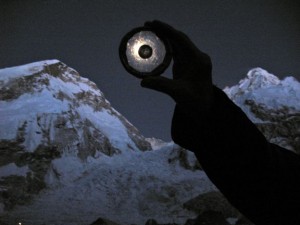Can You Legally Own a Piece of the Moon?
Mr. Ian Sheffield claims to have not one, but two dust samples of the Moon.

Mr. Ian Sheffield of Edinburgh Scotland is miffed. He claims to have not one, but two dust samples of the Moon—one from the Apollo 11 mission and another from the Apollo 15 mission. He explains that he bought these lunar samples “from a dealer” about 3 years ago. The article does not indicate how much he paid for them, but he does allow that each is valued at “around £2000” (about $3300) each.
A problem arose when he planned to display his samples to the public. He apparently wrote to NASA asking if he could exhibit them. To his astonishment, NASA refused to give him permission and demanded the return of the samples, claiming that the lunar dust in his possession was property of the United States government.
Mr. Sheffield’s story of how the samples came into his possession is interesting. He states the dust came off a camera film pack to which a technician in the Lunar Receiving Laboratory was accidentally exposed. Because no one was sure the lunar samples would not contain some possible primitive (and pathogenic) organisms when the Apollo 11 crew first returned to Earth, they had to spend three weeks in quarantine. Anybody in the LRL exposed to lunar material was compelled to join the astronauts in their quarantine. The technician who was exposed went into isolation and (the story claims) upon his release, “was given the dust as a memento.”
My antennae went up at this point. No lunar samples are “given” to private individuals. Each piece of the Moon returned by the Apollo astronauts is carefully accounted for and resides in the Lunar Curatorial Facility in Houston, where they are kept in two separate hurricane-proof vaults. Many lunar samples are loaned to scientific institutions for study. The only lunar samples given away (of which I am aware) were to about a hundred national leaders during President Nixon’s 1969 world tour. The beautiful “Space Window” in the Washington National Cathedral, honoring man’s landing on the Moon, holds a 7.18-gram basalt from Mare Tranquillitatis, on loan to the Cathedral. Other moon rocks were presented to the Apollo astronauts (and Walter Cronkite) in 2004. However, each plaque came with a catch: the lunar samples can not be personally held by the recipients, and must be displayed at a local school or museum. Recently, Astronaut Scott Parazynski was loaned a sample of the Moon’s regolith that he carried to the summit of Mount Everest.
Some diplomatic gifts of lunar samples have found their way onto the black market. A notorious case is a sample presented to the people of Honduras back in 1969. This sample turned up during a NASA Inspector General “sting” which was designed to catch dealers of fake lunar samples. To the agents’ surprise, they were offered a genuine lunar rock: asking price, $5 million. A meeting was arranged and the rock (and presumably, the seller) was seized. Another lunar sample was stolen from a museum in Malta between 1990 and 1994; it was recovered in another sting operation in 1998.
The federal government forbids private ownership of any Apollo sample. Yet, such samples show up every now and then. The most common form they take is dust stuck to adhesive tape (an easy way to “clean” the surface of some exposed sample container, tool, or space suit used on the lunar surface). Mr. Sheffield’s sample is likely to be one of these pieces. Its status, I was surprised to find out, is legally uncertain. Although NASA has sued in court to recover any such bootleg sample, no prosecution has succeeded, except for those caught (literally) in the act of theft. In an embarrassing incident for NASA, a summer intern and two companions carried a safe full of lunar samples out of a building at Johnson Space Center (as Dave Barry would say, I am not making this up). They were apprehended while trying to sell them at bargain basement prices and subsequently prosecuted.
It was rumored for years that several of the Apollo astronauts held samples from their respective missions. If they did, it was probably inadvertent—the lunar dust is extremely adhesive and it is possible that smudges of lunar dust clung to personal items returned from the Moon in their Personal Preference Kits. Alan Bean, who documents the Apollo experience through his oil paintings, is said to add ground-up patches retrieved from his lunar space suit to his works. His reasoning is that because his suit was dirty with lunar dust, some of that dust must find its way into his paintings, giving them a true “lunar” ambiance.
So Mr. Ian Sheffield of Edinburgh may be home free. I might suggest to him that given their quasi-legal status, he is probably better off not calling attention to his possession of these unique artifacts. In fact, although NASA frowns on owning stolen Apollo lunar samples, there are dozens of lunar samples available for sale on eBay. A number of meteorites recovered on Earth, came from the Moon. Although most of them belong to national governments that sponsor the recovery of meteorites from Antarctica, several are in private hands and can be bought and sold, just as any commodity. Right now, there is a very nice anorthositic breccia from the lunar highlands for sale. Better hurry though – the sale only lasts another day. Oh yes, the asking price: a mere $144,000.
By the way, over the years, I have been asked to look at a few “lunar” samples that were in fact, lunar fakes. Caveat Emptor!
/https://tf-cmsv2-smithsonianmag-media.s3.amazonaws.com/accounts/headshot/blog_headshot_spudis-300x300.jpg)
/https://tf-cmsv2-smithsonianmag-media.s3.amazonaws.com/accounts/headshot/blog_headshot_spudis-300x300.jpg)